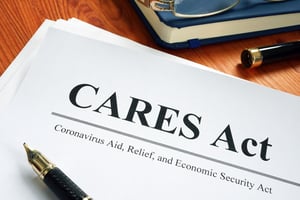CARES Act Offers Much-Needed Cashflow Relief
 The COVID-19 pandemic has had far-reaching consequences across the entire business world and one of the most hard-hitting effects has been the reduction of cash flow throughout nearly all business lines. Invoices are not getting paid on time, monthly bills are accumulating, and for some businesses, (like restaurants and theaters) activity and cash inflow may be completely stopped. To provide some relief to businesses affected by the coronavirus, Congress recently passed the CARES Act which offers the possibility of a one-time infusion of cash in the form of tax refunds.
The COVID-19 pandemic has had far-reaching consequences across the entire business world and one of the most hard-hitting effects has been the reduction of cash flow throughout nearly all business lines. Invoices are not getting paid on time, monthly bills are accumulating, and for some businesses, (like restaurants and theaters) activity and cash inflow may be completely stopped. To provide some relief to businesses affected by the coronavirus, Congress recently passed the CARES Act which offers the possibility of a one-time infusion of cash in the form of tax refunds.
Net Operating Losses & The CARES Act
Under the provisions of Section 2303 of the CARES Act, taxpayers with net operating losses (NOLs) arising in tax years beginning in 2018, 2019, or 2020 are required to carry back such losses to the five previous tax years, counting backward from the year of loss, unless the taxpayer elects to forgo this carry-back. This is a critical change to how NOLs were treated prior to the passage of the CARES Act; under the old law, net operating losses arising in 2018, 2019, or 2020 were disallowed from any carry-back to prior years and could only be carried forward. This meant that taxpayers experiencing a loss year were limited in how they could offset taxable income with NOLs.
How Quickly Will Businesses See Their Refunds?
Thanks to the CARES Act, taxpayers have a new opportunity to claim refunds on prior taxes paid, which can generate much-needed cash for businesses struggling to keep up. By filing Form 1045 (for individuals) and Form 1139 (for corporations), a claimed refund can be delivered to the taxpayer in as little as 90 days.
The pandemic has disrupted many government services, and the IRS is no different. However, they are cognizant that some taxpayers need these refunds as fast as possible, and have set up temporary procedures for fast processing of these refund claims. By faxing Forms 1045 and 1139 to special numbers set up by the IRS, taxpayers can submit refund claims to the IRS and they will be processed notwithstanding the shutdown of normal IRS operations.
Upcoming Deadlines For CARES Act Claims
The deadlines for these claims is approaching fast for some taxpayers. Ordinarily, a taxpayer who has a loss year has 12 months from the close of that year to file the required carry-back claims and claim the rapid refund.
The CARES Act, however, retroactively changed the rules concerning NOLs generated in the 2018 tax year, which previously could not be carried back. Under normal procedures, claims for a refund arising from a 2018 net operating loss would have to be filed by December 31, 2019.
This is impossible considering when the CARES Act was passed by Congress. So, the IRS has issued Notice 2020-26, extending the filing deadline for claims arising from the 2018 tax year. If a taxpayer has a claim for the 2018 tax year, the new filing deadline is June 30, 2020. Taxpayers who had a loss year in 2018 are advised to move on this as quickly as possible.
MRPR stands ready to assist you with the preparation of this carry-back claim and many other tax issues, COVID-related and otherwise. Please contact us for more information.
Topics: Tax Topics, COVID-19 Updates



